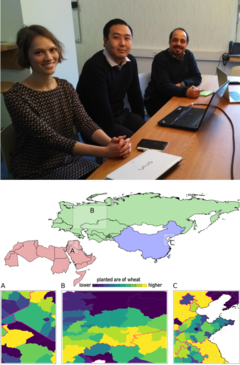
Global Land-Use Dynamics
We address long-standing gaps in Global Change and Sustainability-related sciences by developing gridded data products on global land-use dynamics. This research falls under the banner of the Land Use Change Knowledge Integration Network (LUCKINet), an international collaborative network moved by a vision of free and FAIR data products that depict global dynamics in different facets of land use over the past decades. The contribution of the Macroecology and Society lab to LUCKINet is extensive.
We worked arduously to fill knowledge gaps on global land-use dynamics, pioneering the collation and homogenization of subnational statistical and in-situ records on different land-use facets . Here, we invested substantial resources to mobilize information from regions where either a lack of digitization efforts or language barriers created an apparent data scarcity in “Western” scientific databases. Our foreign-language data consultants Evgeniya Elkina, Yang Liu, and Abdualmaged Alhemiary (shown on the right, top panel) made substantial contributions for this effor, helping us collect data fro Arabic, Russia, and Chinese-speaking countries (bottom panel).
Using data such as this one, we are producing global time-series of land use on all major crops and livestock, allowing us to perceive long-term changes such as the ones shown below.

